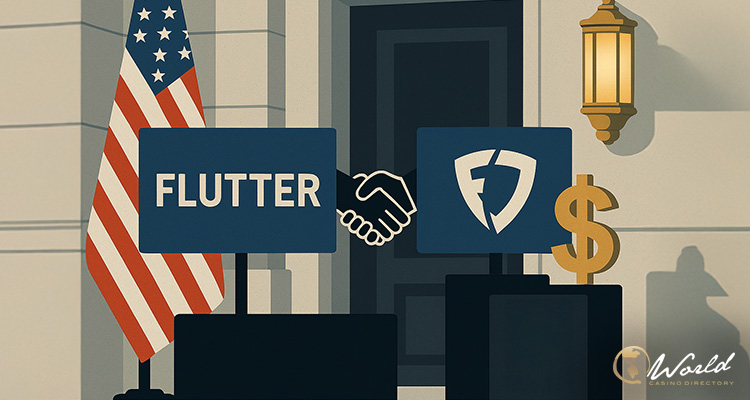Flutter Entertainment has officially reached an agreement to purchase Boyd Gaming Corporation’s remaining 5% ownership in FanDuel, cementing full control over the U.S.’s leading sports betting and iGaming platform. The deal, announced Thursday, comes with a $1.76 billion price tag and is expected to close in the third quarter of 2025, pending regulatory approval.
The transaction also renews and expands the strategic partnership between Flutter and Boyd through 2038. FanDuel, which already holds a dominant 43% share of the U.S. sports betting market and 27% in iGaming, will now be wholly owned by Flutter, which has traded on both the New York Stock Exchange (NYSE: FLUT) and London Stock Exchange (LSE: FLTR).
Major Cost Savings and Strategic Benefits
Alongside the equity acquisition, the agreement restructures commercial terms between the two companies. As part of the revised market access terms in the five states where Boyd provides licensing for FanDuel’s mobile operations, Flutter anticipates significant financial efficiencies. Annual cost savings of approximately $65 million are expected to kick in beginning July 1, 2025.
FanDuel will also continue managing Boyd’s retail sportsbooks outside of Nevada until mid-2026. After that, operational control will revert to Boyd. The Las Vegas-based company expects this revised structure to deliver between $50 million and $55 million in operating income and adjusted EBITDAR for 2025, followed by roughly $30 million in 2026.
Strengthening a Long-Term Strategic Alliance
Flutter and Boyd’s collaboration began in 2018, when Flutter used the partnership to establish its U.S. presence by acquiring a majority stake in FanDuel. That initial agreement included giving Boyd a 5% equity stake. Flutter increased its ownership to 95% in a 2020 transaction valued at $4.1 billion, and with the current deal, brings that to a full 100%.
“This transaction secures 100% ownership of FanDuel, the premier asset in the U.S. sports betting and iGaming market,” said Flutter in a company statement. Flutter CEO Peter Jackson echoed that sentiment, stating: “Our acquisition of FanDuel in 2018 is one of the most transformational events in our Group’s history… I am really pleased to drive future value for our shareholders by increasing our ownership of FanDuel to 100%. Boyd have been fantastic partners for FanDuel, and we are delighted to be extending our important strategic partnership through to 2038.”
Financing the Acquisition Through Debt
To fund the transaction, Flutter has entered into a bridge credit agreement with select banking institutions. The agreement secures a $1.75 billion senior secured first lien term loan. The facility matures 12 months after its first draw, with options to extend in two additional six-month increments. The loan will bear interest at the Term SOFR rate plus a 1.25% margin, with potential step-ups during the loan term.
The borrowed funds will be allocated toward the purchase of Boyd’s stake, associated transaction costs, and general corporate expenses. While the acquisition will temporarily increase Flutter’s leverage, the company expressed confidence that the growing profitability of its U.S. operations will support a return to its target debt ratio of 2.0–2.5x in the medium term.
A Market-Leading Asset in a Competitive Landscape
FanDuel’s $31 billion valuation, derived from this buyout, puts it slightly below its closest competitor, DraftKings, which currently boasts a market cap nearing $40 billion. However, FanDuel continues to outpace rivals in terms of market share and revenue growth. Flutter’s total revenue has nearly doubled since 2020, driven in part by FanDuel’s sustained leadership in online gambling.
While some industry observers had speculated that Flutter might spin off FanDuel in the past to unlock shareholder value, no such plans were mentioned in the current announcement. Still, the valuation and the complete acquisition may reignite investor interest in such possibilities.
Meanwhile, Boyd Gaming has indicated it will use proceeds from the sale to pay down debt, strengthening its balance sheet while maintaining a lucrative, long-term relationship with Flutter.



